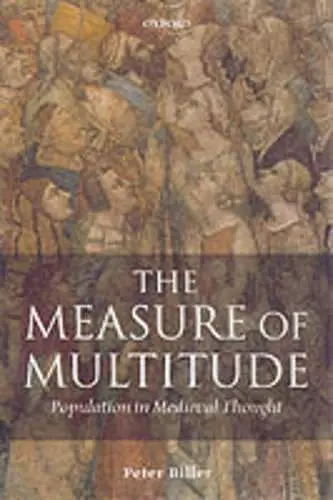The Measure of Multitude
Population in Medieval Thought
Format:Hardback
Publisher:Oxford University Press
Currently unavailable, and unfortunately no date known when it will be back
This hardback is available in another edition too:
- Paperback£27.99(9780199265596)

Joint winner of the 2002 Longman/History Today Prize
Peter Biller's innovative study challenges the view that medieval thought was fundamentally abstract. He describes what medieval people 'thought' about population, studying the texts which constrained their thought, and examining the medieval realities which shaped it, such as birth, birth-control, sex-ratio, marriage ages, length of life, and the population of the Holy Land.Peter Biller's innovative study challenges the view that medieval thought was fundamentally abstract. He shows how, by 1300, medieval men and women were beginning to measure multitude, counting, for example, numbers of boys and girls being baptized. Their mental capacity to grapple with population, to get its measure, was developing, and the author describes how medieval people thought about population through both the texts which contained their thought and the medieval realities which shaped it. He asserts that they found many topics - such as the history of population and variations between polygamy, monogamy and virginity-through theology, and that crusade and travel literature supplied the themes of Muslim polygamy, military numbers, the colonization of the Holy Land, and the populations of Mongolia and China. Translations of Aristotle provided not only new themes but also a new vocabulary with which to think about population. The Measure of Multitude sets academic discussions of population alongside the medieval facts of 'birth, and copulation, and death' to provide a challenging new approach to the study of medieval demographic thought.
... this tour de force of intellectual archaeology ... a fascinating exposition of a whole series of 'demographic' subjects to which medieval writers gave their attention. * English Historical Review *
... a work of intellectual integrity and humility. Biller is acutely sensitive to what the surviving evidence can or cannot sustain ... a model of how intellectual history should be written, a work which is impressive as much for its formal approach as for its final conclusions. * English Historical Review *
This is a book which entertains as much as it instructs ... a lucid, scholarly, imaginative and persuasive book. Not the least of Biller's achievements is to have made so compelling a model for 'intellectual history' such an exciting read as well. * English Historical Review *
There are many strengths to this book, not least the imaginative lateral thinking required to conceive the topic in the first place ... an outstanding and original study, which approaches the high middle ages (in its reality as well as its thought worlds) from an unexpected but remarkably productive direction. Its heterogeneous interests should inspire a wide readership, including scholars of medieval medicine, population, theological thought, religious practice and canon law. * History *
This excellent book is not a study of medieval population (although it does contain, amongst many other riches, a helpful summary of work on medieval demography) but concerns how medieval people thought about population ... astounding range of material. * History *
Peter Biller has produced a trail-blazing book, packed with intellectual fireworks. It fuses diverse sources and scraps of information to detonate an explosion of insights ... anyone interested in pre-modern medicine must read it. It will stimulate and satisfy the curiosity of students and researchers alike. * Medical History *
Biller takes the reader on a grand tour of sources and themes ... There is no jargon in his book. He sensitively lets these texts speak, contextualizes them, and occasionally offers informed conjectures whenever the text does not provide a clear-cut proof. * Medical History *
This is not only a solid scholarly enterprise on the highest level, it is also a pedagogic manifesto of how one can and perhaps should handle historical sources. * Medical History *
This is an impressive piece of scholarship. Through careful explication of the sources, Biller provides an account of medieval demography that places medicine in a new and exciting context, one which gave medical theory added relevance for its contemporaries . This is a story to which every historian of medieval medicine will want to pay close attention. * Social History of Medicine *
Biller adopts a sophisticated approach to his material ... This work is primarily an exercise in the history of ideas, but it is also an extremely rich source of information for social historians of medicine. * Social History of Medicine *
Peter Biller ends his book with a question: is medieval demographic thought recognisably there? He has left his readers with only one possible answer - and in doing so changed the way we must think not just about the medieval past but about what has come after in terms of understanding the world. * History Today *
- Winner of Joint winner of the 2002 Longman/History Today Prize.
ISBN: 9780198206323
Dimensions: 243mm x 163mm x 32mm
Weight: 889g
506 pages